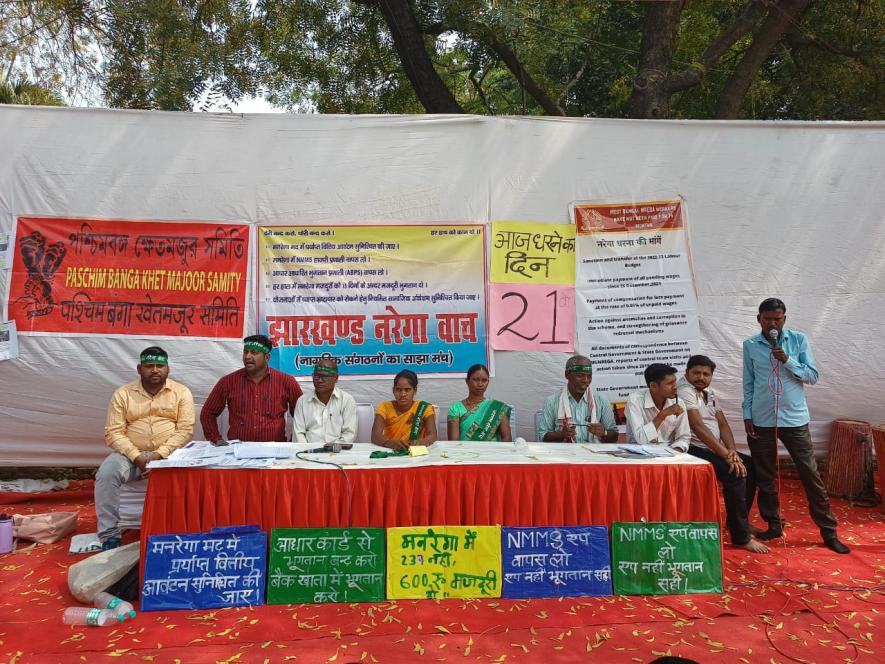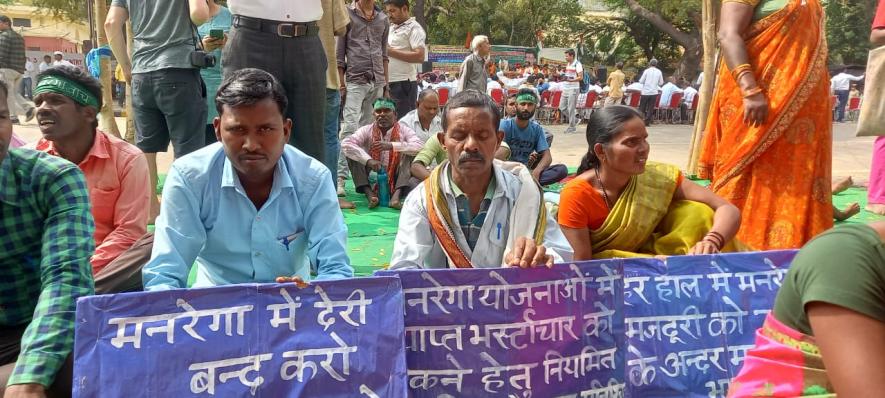MGNREGA App: Baton Handed to Workers from Jharkhand in Over Month-Long Protest in Delhi

Image Courtesy: Nrega Sangharsh Samiti
New Delhi: Workers from different states are landing up in Delhi’s Jantar Mantar to protest against the Centre’s move to make attendance mandatory on a mobile application. Most of the workers struggle to understand the new system, many did not even have smartphones until now, and the major issue is the long stuck payments that they have to deal with.
The protests kicked off in February 2023 when the workers from Bihar were in Delhi. This was followed by the workers from West Bengal carrying the baton forward, and after the festival of colours, Holi, now workers from Jharkhand have taken over the protest site in the National Capital.
Among other problems, the major issue that even the workers from Jharkhand have been facing is the Nrega Mobile Monitoring System (NMMS) mobile application. The app that was meant to reduce the complications has had a different story on the ground. As per the data by MGNREGA Sangharsh Morcha, which majorly comprises the workers themselves, the workers have been missing out on around 50% of their wages owing to technical glitches in the app or because they are not well versed with its functionalities. Many mates(supervisors at work sites) have also taken loans to buy a smartphone. But all the loss in wages does is put them in a tough spot economically.
45-year-old Sumesh has come all the way from Latehar to plead with the government about the problems he has been dealing with. Unlike the workers from Bengal, getting work under the scheme is not a problem for the workers from Jharkhand. Even if a worker like Sumesh, who has studied till the 10th grade and knows how to use the phone, there are other problems that adivasi (tribal) workers like him have no control over.
“There is no proper mobile network in our area. It is entirely a tribal area, away from the hubbub of the town, but since there is no network, we are unable to use the application and give our attendance. Had it been one place where we put our attendance, it would have been fine. But there are different work sites where we go. And it is impossible to put our attendance in every place,” said Sumesh.
The rural job guarantee scheme workers from tribal belts believe the government should have first considered how the workers come from far-flung areas that have no access to a good mobile network. Manila Lakda is a middle-aged woman who is a mate. She is currently working at the Khel Maidan in the Latehar district. Due to the mobile network problem, she has to wait for hours just to get a tower and register herself.

“One day I had to wait for over three hours before I could register myself. And there are days when ultimately due to lack of network I have to give up on the day’s wage and return home losing the pay,” she told NewsClick.
Women comprise over half of the Mahatma Gandhi National Rural Employment Guarantee Act (MGNREGA) workforce, and they are the ones to suffer the most. Those who have kids find it difficult to manage the kid’s food and schooling alongside maintaining attendance at the worksite twice a day.
Philomina Toppo, another mate from a village in Jharkhand, narrates a similar tale of problems. She told NewsClick, “Men easily reach the work site at 9 a.m, complete all the procedures of attendance and start off their work. But for us, it is different. Our day begins with preparing food, sending our husbands for work, then getting the kids ready and completing the household chores after which we can go to work.” By the time Toppo reaches the site, it is already over half past nine, and they end up missing out on the day’s attendance.
On one hand, where the Central government has been claiming to provide convenience to the workers with the new measures, the budgetary allocation has been drastically reduced. The budget has been reduced to Rs 60,000 crore. In a pre-budget note, the MGNREGA Sangharsh Morcha had even recommended that the budget must have Rs 2.72 lakh crore in order to provide legally guaranteed 100 days of work to the workers for at least those who worked in the current Financial Year (FY). The current allocation as a percentage of the Gross Domestic Product (GDP) is only 0.19% which is the lowest ever in the history of MGNREGA.
As mentioned earlier, most of the mates and workers struggle to understand the functionality of the app, and many did not even have smartphones until very recently when they were compelled to buy one. Sarita participated in canal work, which continued for around 40 days. She comes from a very poor family in a place in Latehar district where there is no electricity, sometimes for several hours. In a condition like this, she somehow managed to buy a smartphone, but this happened only after the completion of at least 15 days of work done already. As a result, her attendance could not be registered for those days and she has suffered a loss.
As of now, MGNREGA workers from Jharkhand sit at the protest site all day, singing songs, narrating their plight, taking the stage to tell their stories, and expecting some help from the government. Workers who have lost days of wages, and ones who are in heavy debt, all continue to raise their voices. In the future, there will be workers from other states as well who will join in the revolt.
Get the latest reports & analysis with people's perspective on Protests, movements & deep analytical videos, discussions of the current affairs in your Telegram app. Subscribe to NewsClick's Telegram channel & get Real-Time updates on stories, as they get published on our website.






















